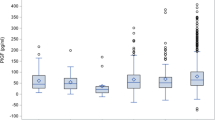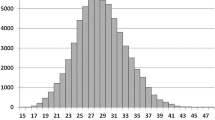Abstract
Objective
To find out whether maternal serum screening for fetal chromosomal aneuploidy predicts adverse pregnancy outcomes.
Methods
A two-year retrospective case–control study was conducted at a tertiary hospital. Pregnant women with a high-risk serum screen but with chromosomally normal fetuses (n = 189) were compared to those with low-risk screen (controls, n = 157) for adverse pregnancy outcomes.
Results
Women with high-risk double marker or combined screen were found to have higher prevalence of LBW [OR 2.56; 95 % CI (1.01–6.53), p < 0.05] and PT [OR 2.93; 95 % CI (1.11–7.65), p < 0.05], while women with high-risk triple screen had higher prevalence of PIH [OR 3.72; 95 % CI (1.23–11.18); p < 0.05], Oligo [OR 4.50; 95 % CI (1.30–15.64); p < 0.05], delivery by C-section [OR 2.51; 95 % CI (1.41–4.47); p < 0.005] as compared to low-risk women. PAPP-A was found to be a significant predictor of birth weight (R 2 = 12.2 %, β ± SE = 0.224 ± 0.069; p < 0.005) and gestational age (R 2 = 4.9 %, β ± SE = 0.613 ± 0.296; p < 0.05). Beta hCG in first and hCG in second trimester predicted oligohydramnios (R 2 = 9.2 %, β ± SE = −0.077 ± 0.025; p < 0.005). The areas under the ROC curves of PAPP-A for LBW and PT were 0.70(p < 0.01) and 0.684 (p < 0.05), respectively.
Conclusion
A “high-risk” maternal serum screen with abnormal PAPP-A and/or beta hCG/HCG is associated with adverse pregnancy outcomes and may help identifying women requiring additional fetal surveillance.

Similar content being viewed by others
References
Cole LA. Biological functions of hCG and hCG related molecules. Reprod Biol Endocrinol. 2010;8:102.
Morris RK, Cnossen JS, Langejans M, et al. Serum screening with Down’s syndrome markers to predict pre-eclampsia and small for gestational age: systematic review and meta-analysis. BMC Pregnancy Childbirth. 2008;8:33.
Dane B, Dane C, Batmaz G, et al. First trimester maternal serum pregnancy-associated plasma protein-A is a predictive factor for early preterm delivery in normotensive pregnancies. Gynecol Endocrinol. 2013;29(6):592–5.
Spencer K, Cowans NJ, Avgidou KA, et al. First trimester biochemical markers of aneuploidy and the prediction of small for gestational age fetuses. Ultrasound Obstet Gynecol. 2008;31:15–9.
Canini S, Prefumo F, Pastorino D, et al. Association between birth weight and first-trimester free beta-human chorionic gonadotropin and pregnancy-associated plasma protein A. Fertil Steril. 2008;89(1):174–8.
Patil M, Panchanadikar TM, Wagh G. Variation of papp-a level in the first trimester of pregnancy and its clinical outcome. J Obstet Gynaecol India. 2014;64(2):116–9.
Hsieh TT, Hung TH, Hsu JJ, et al. Prediction of adverse perinatal outcome by maternal serum screening for Down syndrome in an Asian population. Obstet Gynecol. 1997;89(6):937–40.
Duric K, Skrablin S, Lesin J, et al. Second trimester total human chorionic gonadotropin, alpha-fetoprotein and unconjugated estriol in predicting pregnancy complications other than fetal aneuploidy. Eur J Obstet Gynecol Reprod Biol. 2003;110(1):12–5.
Sritippayawan S, Vachirasrisoontra C. Adverse pregnancy outcomes after a false-positive second trimester serum screen for Down syndrome in Thai pregnant women. J Med Assoc Thai. 2005;88(4):449–54.
Morssink LP, Kornman LH, Hallahan TW, et al. Maternal serum levels of free beta-hCG and PAPP-A in the first trimester of pregnancy are not associated with subsequent fetal growth retardation or preterm delivery. Prenat Diagn. 1998;18(2):147–52.
Schnettler WT, Hacker MR, Barber RE, et al. Management of abnormal serum markers in the absence of aneuploidy and neural tube defects. J Matern Fetal Neonatal Med. 2012;25(10):1895–8.
Gagnon A, Wilson RD, Audibert F, et al. Obstetrical complications associated with abnormal maternal serum markers analytes. J Obstet Gynaecol Can. 2008;30(10):918–49.
D’Antonio F, Rijo C, Thilaganathan B, et al. Association between first-trimester maternal serum pregnancy-associated plasma protein-A and obstetric complications. Prenat Diagn. 2013;33(9):839–47.
Tape TG. Interpreting diagnostic tests. http://gim.unmc.edu/dxtests/Default.htm (2014). Accessed 22 Dec 2014.
Ardawi MS, Nasrat HA, Rouzi AA, et al. Maternal serum free-beta-chorionic gonadotrophin, pregnancy-associated plasma protein-A and fetal nuchal translucency thickness at 10–13(+6) weeks in relation to co-variables in pregnant Saudi women. Prenat Diagn. 2007;27(4):303–11.
Wright D, Abele H, Baker A, et al. Impact of bias in serum free beta-human chorionic gonadotropin and pregnancy-associated plasma protein-A multiples of the median levels on first-trimester screening for trisomy 21. Ultrasound Obstet Gynecol. 2011;38(3):309–13.
Quattrocchi T, Baviera G, Pochiero T, et al. Maternal serum PAPP-A as an early marker of obstetric complications? Fetal Diagn Ther. 2015;37(1):33–6.
Sharp AN, Alfirevic Z. First trimester screening can predict adverse pregnancy outcomes. Prenat Diagn. 2014;34(7):660–7.
Halscott TL, Ramsey PS, Reddy UM. First trimester screening cannot predict adverse outcomes yet. Prenat Diagn. 2014;34(7):668–76.
Roberge S, Nicolaides KH, Demers S, et al. Prevention of perinatal death and adverse perinatal outcome using low dose aspirin: a meta-analysis. Ultrasound Obstet Gynecol. 2013;41(5):491–9.
Villa PM, Kajantie E, Raikkonen K, et al. Aspirin in the prevention of pre-eclampsia in high-risk women: a randomized placebo-controlled PREDO trial and a meta-analysis of randomized trials. Br J Obstet Gynaecol. 2013;120(1):64–74.
Moore GS, Allshouse AA, Post AL, et al. Early initiation of low-dose aspirin for reduction in preeclampsia risk in high-risk women: a secondary analysis of the MFMU high-risk aspirin study. Tang J Perinatol. 2014;. doi:10.1038/jp.2014.214.
Henderson JT, O’Connor E, Whitlock EP. Low-dose aspirin for prevention of morbidity and mortality from preeclampsia. Ann Intern Med. 2014;161(8):613–4.
Ayala DE, Ucieda R, Hermida RC. Chronotherapy with low-dose aspirin for prevention of complications in pregnancy. Chronobiol Int. 2013;30(1–2):260–79.
Huynh L, Kingdom J, Akhtar S. Low pregnancy-associated plasma protein A level in the first trimester. Can Fam Physician. 2014;60(10):899–903.
Funding
This study was funded by Deenanath Mangeshkar Hospital and Research Center.
Author information
Authors and Affiliations
Corresponding author
Ethics declarations
Conflicts of interest
None.
Human and Animals Rights
This article does not contain any studies with human participants or animals performed by any of the authors.
Informed Consent
Informed consent waived off for retrospective study.
Additional information
Koumudi Godbole MD, FCCMG, is Consultant Clinical Geneticist in Department of Genetic Medicine, Deenanath Mangeshkar Hospital and Research Center, Pune, India; Aparna Kulkarni MD, MRCOG, M Phil, is Consultant in Fetal Medicine, Deenanath Mangeshkar Hospital and Research Center, Pune, India; Asawari Kanade PhD, is Consultant Statistician in Department of Research, Deenanath Mangeshkar Hospital and Research Center, Pune, India; Shilpa Kulkarni BHMS, is Coordinator in Prenatal Medicine Program, Deenanath Mangeshkar Hospital and Research Center, Pune, India; Girish Godbole MD, is Consultant Obstetrician and Gynecologist in Deenanath Mangeshkar Hospital and Research Center, Pune, India; Anuradha Wakankar MS, MRCOG, is Consultant Obstetrician and Gynecologist in Deenanath Mangeshkar Hospital and Research Center, Pune, India.
Rights and permissions
About this article
Cite this article
Godbole, K., Kulkarni, A., Kanade, A. et al. Maternal Serum Aneuploidy Screen and Adverse Pregnancy Outcomes. J Obstet Gynecol India 66 (Suppl 1), 141–148 (2016). https://doi.org/10.1007/s13224-015-0826-2
Received:
Accepted:
Published:
Issue Date:
DOI: https://doi.org/10.1007/s13224-015-0826-2




